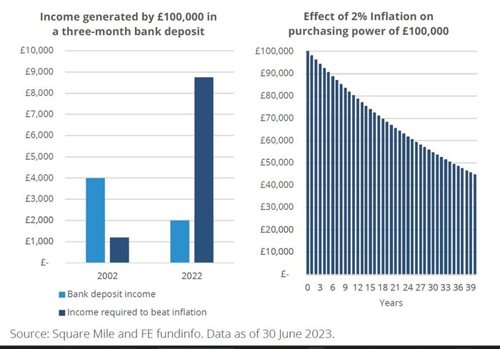Should you keep savings in cash or invest?
Posted on 27/07/2023 by Sue Stevens
With top-paying savings accounts in the UK now paying around 4% interest, and with cash rates for one-year fixed term accounts going as high as 5%, many consumers are now wondering whether they should simply hold onto their cash savings rather than investing.
To help clients with this tricky issue, we have looked to outline the advantages of both saving cash and investing.
Advantages of holding cash
- Cash is now offering 4% interest, which is an attractive return and will not lose value in nominal terms.
- Cash rates will/should increase as interest rates rise, although this will likely not apply to fixed-term accounts.
- If inflation proves stubborn and interest rates need to move higher or stay high for a while, then cash rates should benefit from this.
- If inflation falls below cash rates, then investors will make gains in real terms.
- Cash can help shelter portfolios from short-term market volatility.
Disadvantages of holding cash
- Cash rates will decrease as interest rates fall, reducing returns; and providers will likely be very fast to cut rates on products as interest rates come down.
- Yields on bonds are always typically higher than those from cash. The UK 10-year government bond is currently yielding 4.5% and corporate bond markets (debt issued by companies rather than governments) even more than this; closer to 6% for the UK corporate bond market.
- Bond yields will likely fall as interest rates drop and this should increase bond prices therefore adding capital growth. For example, a 1% fall in yields should lead to a capital gain of c.10% for a 10-year bond.
- Cash must be held on account or invested in a money market fund for the whole year to capture the full rate.
- Investing in cash will reduce/remove the participation in any continued market recovery, in bonds or equities. These asset classes have proved to deliver returns ahead of cash rates over the long term.
- Being out of the market, both bonds and equities, on days when they move up very sharply dramatically reduces the long term returns for portfolios, i.e., consistently timing the market correctly is impossible. These days often happen when markets are volatile and performing at their worst.
- For cash rates to outpace inflation, the rate paid needs to be higher than the inflation level. This is currently not the case with inflation at 8.7% in the UK.
- Falling inflation, which is expected despite recent figures, will reduce the need for high interest rates, and will therefore lower cash rates as they fall.
- Higher interest rates increase the chances of a recession and destabilising the housing market, which would increase the likelihood for interest rate cuts and therefore lower cash rates.
- Some accounts only allow a limited amount to be invested each month, up to a maximum level for the year. This means in the first year you will not receive the cash rate on the full amount allowed, but only on the amount that is invested each month.

In summary – should you save or invest?
While saving some money in cash makes sense for short-term goals, investing in the markets could serve you better over the longer term.
With all of the negative news at the moment, it’s perfectly understandable that investors see advantages in keeping more of their wealth in cash. Nevertheless, history shows that markets will bounce back from periods of doom and gloom and can be an effective way of making your savings grow in real terms, ahead of inflation.
Important Information
